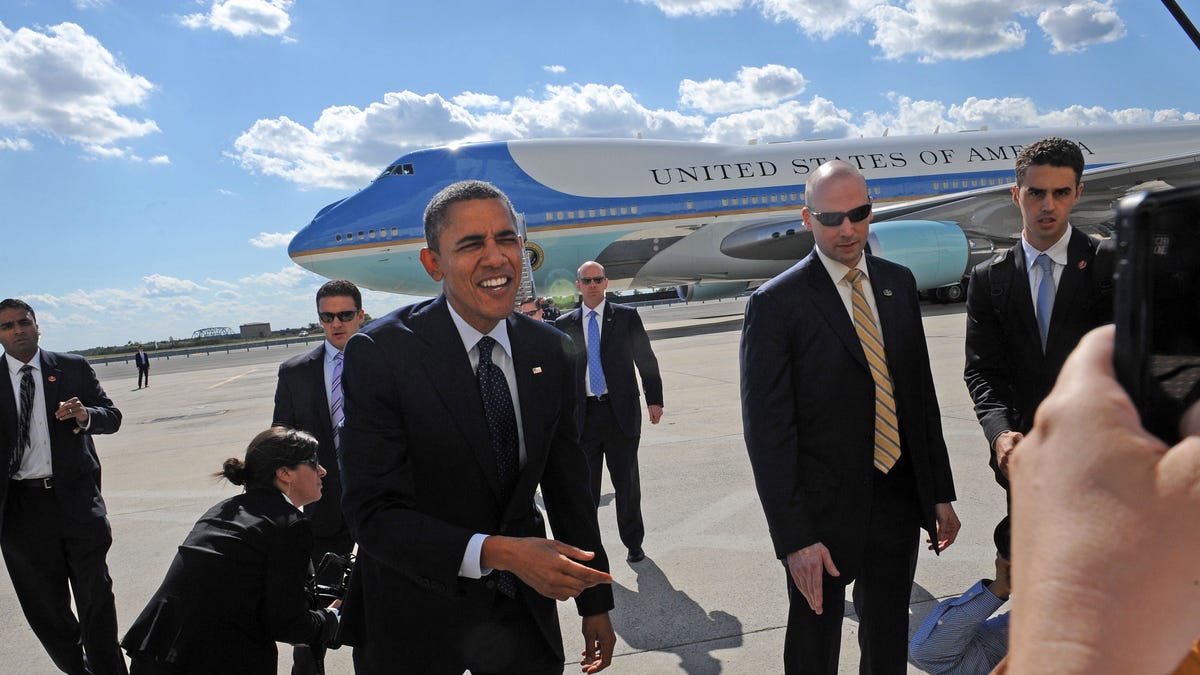
FILE: Sept. .24, 2012: President Barack Obama arrives at JFK International Airport in New York. (AP)
President Obama, under pressure to address the surging unrest in the Middle East as well as the deadly attack on the U.S. Consulate in Libya, will have the chance Tuesday to explain to world leaders and U.S. voters alike what he sees as the Arab Spring aftermath's meaning for U.S. interests abroad.
In a highly anticipated speech to the United Nations General Assembly, the president is expected to address the recent tumult overseas as well as provide an update on the United States’ position on Iran’s quest for a nuclear weapon.
White House Press Secretary Jay Carney, previewing the speech Monday, said it "always provides an opportunity for the president to put the international situation in context and to put forward a vision of U.S. leadership, and that's what he will do."
The last time Obama addressed the assembly, there was an air of hope surrounding the Arab Spring. U.S. officials remain optimistic, but some also worry that the latest unrest is perhaps the dark side of the revolution.
The consulate attack also has led to complaints on Capitol Hill that the administration is bungling the facts.
The administration now calls the Sept. 11 assault on the consulate, which killed Ambassador Christopher Stevens and three other Americans, a terrorist attack – though one official initially said it was a “spontaneous” event triggered by protests over an anti-Islam film. Obama still plans to address the film in his U.N. speech Tuesday, Carney said.
"The president will make it clear that we reject the views in the video that has caused offense in the Muslim world, while also underscoring that violence is never acceptable," he said.
Republicans leaders are hoping Obama will make clear his position on several foreign policy fronts – including his alleged approach of “disengagement” in the Middle East, which they say has left an exploitable void in the region that led to the recent uprisings. More than 40 people have been killed during protests in recent weeks in 20 countries.
Sen. John McCain, the ranking Republican on the Senate Committee on Armed Services, and other party members have suggested that the president's policy of pulling out of Afghanistan and Iraq while offering less than total support for Israel’s effort to stop Iran from acquiring nuclear weapons has left U.S. interests vulnerable.
They also have questioned his position on the so-called Arab Spring, in which several dictatorships were removed and residents were left with democratic governments potentially susceptible to Islamist and militant influence.
On Monday, Wyoming GOP Sen. John Barrasso outlined several messages he thinks Americans want to hear during Obama’s speech at the United Nations General Assembly, including that the war on terror is not over and the anti-Islamic film alone did not spark the Middle East violence. He also called for an assessment of the real state of U.S.-Russia relations since leaders pressed to so-called “reset button,” as well as a full commitment to Israel.
“When the president says ‘We have your back,’ the world needs to know what he actually means,” Barrasso told Fox News.
Carney, hours later in previewing Obama’s upcoming remarks, vehemently defended the country’s commitment to Israel and the president’s belief that Egypt, Libya and other Middle East countries will eventually achieve democracy.
“I think the president's views on these matters are very clear and very strong,” Carney said. “We have an unshakeable commitment to Israel's security and we have proven that commitment. ... The president, again, has made clear on numerous occasions that Israel is our closest ally in the region.”
























